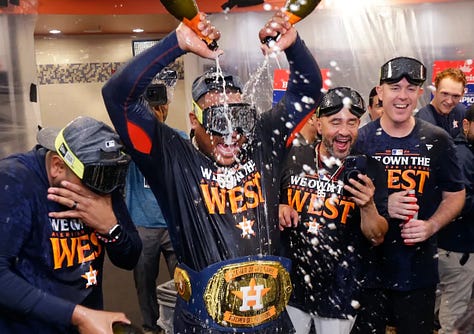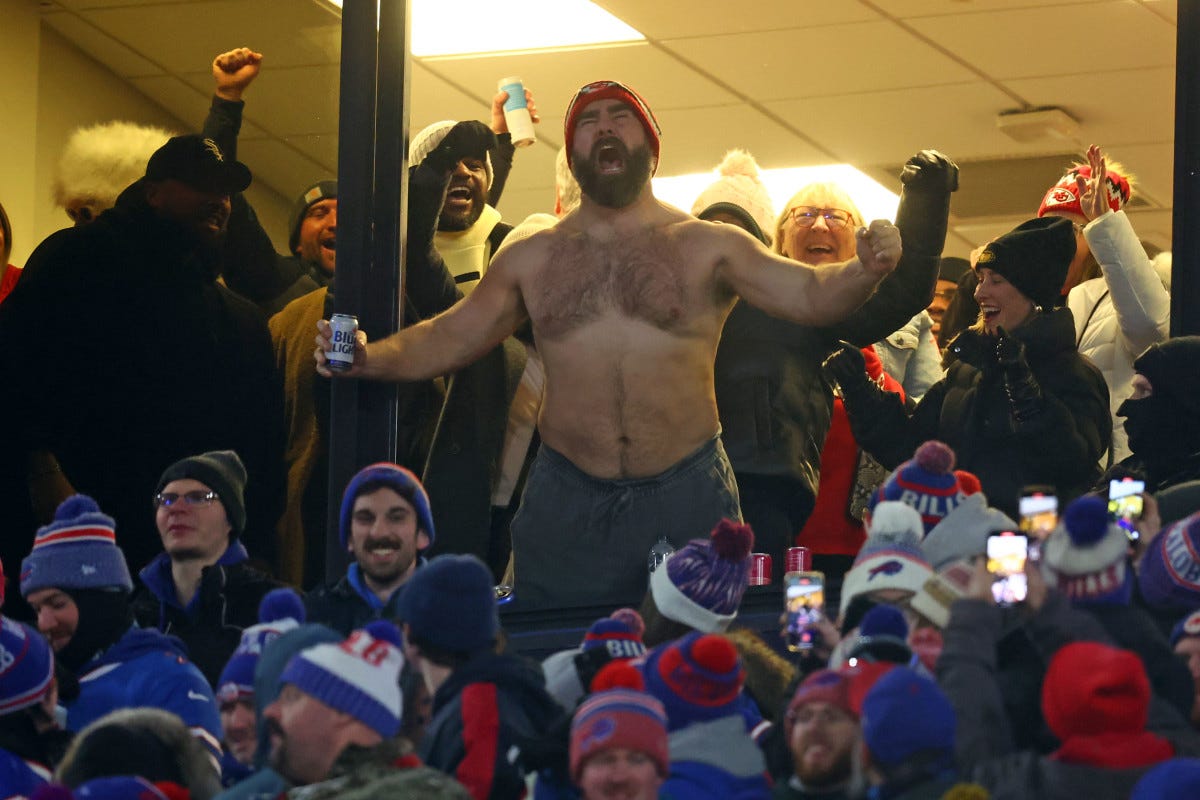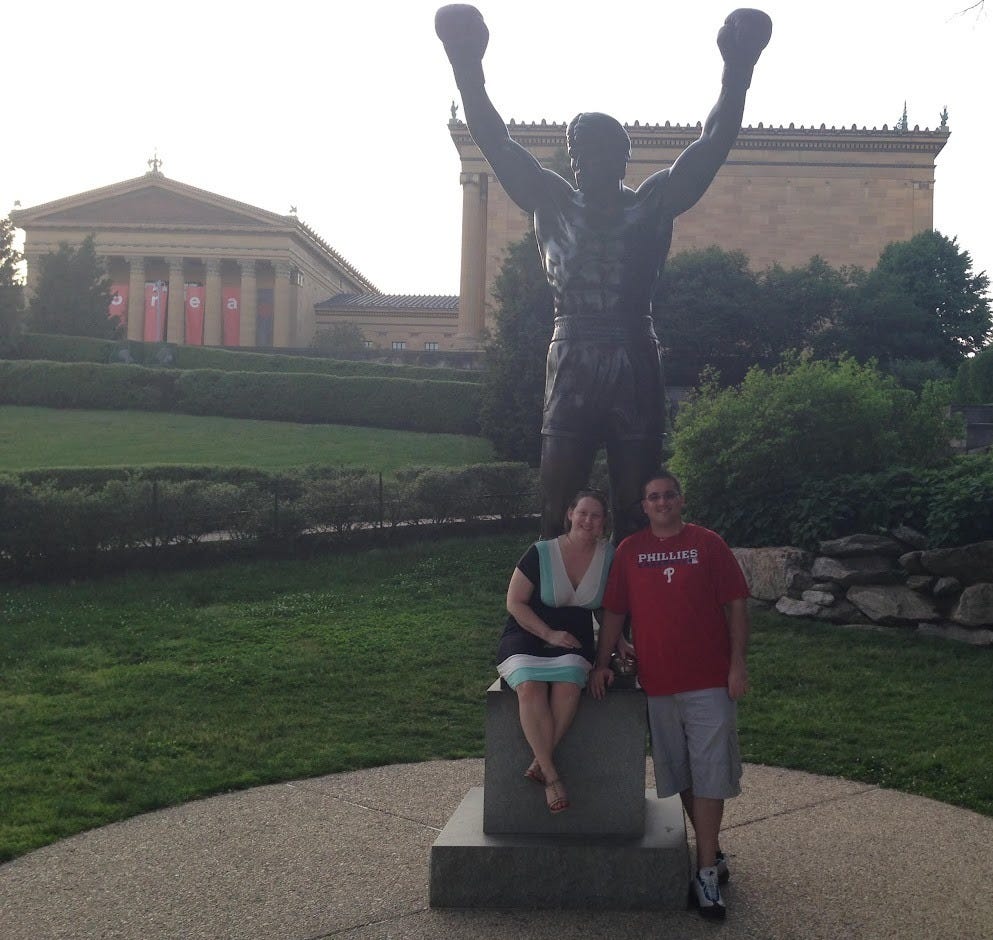I was born and raised a big sports fan so earlier this week when my Philadelphia Phillies clinched the National League East division to make it to the playoffs, I was excited but perhaps not as excited as the team was. They knew it was coming so the locker rooms were ready for the party, stocked with cases upon cases of beer and bottles upon bottles of champagne. The media came prepared with rain jackets, goggles, and plastic ponchos to put over their cameras.
Why would they need rain gear, you wonder. Because this is how they celebrate:
*Video taken with my phone of my TV watching the celebration.
Not only do the baseball players chug booze for the camera, showcasing irresponsible consumption to the world, but they also pop bottles then douse each other with it, wasting cases of champagne and creating a flood on the floor of the locker room.
And keep in mind - the season wasn’t over, they just clinched going to the playoffs, which meant they had another game, the very next day, and 2 more series after that.
It’s not just a strange Philadelphia thing either.
Every single team has this type of celebration after winning the game that gets them into the playoffs. They will do it again if they win their divisional game to make it to the World Series, and they will do it a 3rd time if they are lucky enough to win the World Series. I’m sure it’s a whole Budweiser promotional deal at this point.
Here are just some images from teams around the league making it into the playoffs.



After the winning game, the media try to conduct interviews but just catch guys singing into the microphone as a good song comes on. Sports analysts try to break down the game but all they end up doing is narrating a chaotic scene of bros doing what bros do best - chug booze and bounce around. The music is loud, the chants and singing get louder, and after a few minutes of watching, I had to change the channel.
And I can’t help but wonder, what is the impact of this celebration on the people watching?
Especially the kids, how do they understand what they are seeing? As they watch their heroes honor their win with debauchery, do they start to think it’s “cool” to behave that way? Does this make the people watching want to celebrate their accomplishments with alcohol too?
I have seen my college graduates in their cap and gowns on campus, walking around with friends to do a photo shoot the day before commencement with champagne. I’ve seen them try to get that perfect Instagram shot while popping the bottle and spraying the alcohol around. Last year, I saw a senior in full graduation regalia shotgun a beer under the college’s gate while a friend snapped pictures.
I know our Phillies did not create this culture. It’s a broader American issue. The media takes pop culture and magnifies it, which makes substance use the norm in our society, especially during sports and celebrations.
A Sobering View
As a sober person, I wonder how other sober people feel about this spectacle. Does it disgust them or make them crave a drink? I can tell you it doesn’t impress me to watch people chug beers, instead, it makes me question their judgment.
It’s one thing to have a drink at a party, it’s entirely different to have alcohol be the only focus of the party. Back when I was drinking, I felt this way too. I always tried to get friends to go to a bar that had pool tables or other games so I had something to do other than focus on the drinking only. That’s what bothers me the most about the display of champagne drenching and drinking. It becomes the whole show, the big deal, the main feature.
For baseball players to leave their fans out in the ballpark cheering after the big win, let alone their wives/kids if they have them, to instead jump around in soaked shirts is not an honorable choice in my book. Instead, it belittles the accomplishments made.
Sure, they do it to let off steam, but what are the other ways they could do that? Is alcohol truly the only thing they can think of to utilize? That just shows a lack of creativity. I see it as disgraceful, in my opinion, to allow alcohol to be the only method of celebration in our society.
*NOTE: You don’t have to agree with me. I understand this is a divisive opinion. I used to be cautious about sharing my thoughts about alcohol culture as I was afraid of being shunned. Gratefully, I no longer care about how others perceive me. Both my yoga practice and turning 40 have helped in this regard! If you read this post and think I’m talking about you or your drinking behaviors, ask yourself why you feel that way. Turn your questions inward. Because I promise, this isn’t about you.
This topic is also one of the themes of my book Fragile Thoughts: A Healing Memoir
In addition to the impact on the spectators, what about the non-drinkers on the team? How do the sober people in the clubhouse feel about this tradition? As a sober person watching it, I had to change the channel. But if I was a part of the organization, I might not have the luxury of leaving. How does this celebration impact them?
I did notice a few men who did the whole champagne-soaking commemoration and then left to head back onto the field where they hung out with their wives and their kids, taking pictures. This was heartwarming as it creates a core memory for their children while also showcasing to the kids watching at home that family matters. The fans in the stands also appreciated it. However, the media didn’t stay with them for long. Instead, they returned to the cameras inside where some would say it’s more fun to watch. I would say that it’s disappointing to see.
Philadelphia Pride
For those not from the Philadelphia region, our city, and its suburbs are full of hardworking individuals who enthusiastically support our teams. We were raised with “I Bleed Green” Eagles onesies and taught to sing the fight song as toddlers. Going to our first baseball game is a cherished memory and relished as we grow older, still attending games and experiencing that same electric energy at the ballpark.
Now in my 40s, I smile each time a friend posts a video of their kid going to their first game, wearing the team’s colors from head to toe. I still receive Philly sports gear for Christmas every year from my parents. Last year, it was earrings for the top three local teams: Eagles (football), Phillies (baseball), and 76ers (basketball). The team names honor our country and our city.
We respect and honor the players who live out our values on the field or the court - and we love grit almost more than anything else.
Our hockey mascot is even named Gritty!

The individual players who get the most love are the ones who are dedicated and fight hard to win, like Rocky in the movies. The character was a small-time boxer from Philly who had the guts to fight the heavy-weight champion of the world and was able to hold his own in the ring. He didn’t outright win or lose, instead, he refused to give in or go down, showcasing extreme stamina and grit.
That grit is what Philadelphia is all about.
The most beloved players from our city represent this ideal of grittiness and showcase:
a strong work ethic and resolve without whining
a sense of determination to show up every day to give it their all
personal responsibility as an individual while holding each other accountable
And I’ve noticed another trait - beloved players in Philly have a love of booze. It seems that being a big drinker who can get rowdy and knows how to dance is a big bonus for our fans.
Why is Booze So Beloved?
If you live anywhere in America, you have heard of the Kelce brothers. Jason just retired as the center and a 6-time all-pro future hall-of-famer on the Eagles and his younger brother, Travis, is a 3-time Superbowl Champion who plays tight end on the Kansas City Chiefs. The two played against each other in the Superbowl in 2023 and got all kinds of press and promotional deals, including an Amazon Prime documentary called Kelce. Oh, and Travis is dating Taylor Swift. So they are getting ALL the press right now.
I bring up the Kelce brothers because Jason is one of the most beloved players in Philadelphia. I love him! Not only is he a top-notch athlete, but his overall kind disposition, lack of ego, sportsmanship, leadership, generosity of spirit, emotional awareness and openness, wittiness, and focus on his family make him a lovable character in our town. (Can you tell I’m a big fan of him? <3)
And yet…this was that very same man after our team lost last year, watching his brother play in the playoffs:

While I love Jason for the man and athlete he is, I was disappointed seeing this. The TV crews kept going to him in the box showcasing his over-the-top behavior because that gets ratings. It started with him chugging beers, then taking his shirt off, then heading out of the box and into the stands shirtless with snow on the ground, in February in Buffalo, New York. Fans loved it and had their children take pictures with him. It was all over social media.
While I’m a fan of his, I am not a fan of this wild behavior. Not only does it normalize alcohol use (irresponsible alcohol use), it acts as a call to others to follow in his footsteps. These unrestrained actions allow others to justify their own rowdy behavior when intoxicated. Because he’s a role model on the field, people see him as a role model off the field.
But it’s not just Jason (who again, I adore as a person). It’s the whole of sports everywhere, and it was especially evident to me this past week with the Phillies win.
I don’t expect all people to sip tea and calmly watch a sports game sober but I wish it was tamed down a bit, not as unruly, and more focused on the game. The sport is what brings us all together yet many can’t enjoy the game without alcohol. Alcohol culture has seeped into sports, and it has me not as interested in the game.
Journal Prompts:
How does alcohol influence your celebrations? Consider events like birthdays, holiday parties, and weddings. Is alcohol the main focus? Why or why not? If you would like to make changes to these norms in your own life, how would you go about doing so?
If in America: in what ways has our society’s normalization of alcohol use impacted your choices around alcohol? If outside of America: What is the societal norm regarding alcohol and how does that impact your choices to use or not?
Have you ever held in your thoughts or beliefs for fear of how others would perceive you? How can you work to care more about staying true to your soul and care less about satisfying others?
The October Learning Circle is Getting Ready to Start!
We’ll be reading The Four Agreements: A Practical Guide to Personal Freedom by Don Miguel Ruiz - a classic that offers ancient wisdom and is a quick read with only 160 pages. It’s been a NY Times bestseller for over a decade for good reason.
I’ve read it multiple times and each time I do, I glean new insights and valuable lessons for living.
We’ll meet virtually on Tuesdays October 8 and 22 from 745pm-9pm to discuss the book and the lessons it offers. I’ll prepare thoughtful discussion prompts and journal prompts for homework between our two sessions. Save your spot by signing up on my website. And start reading ahead if you want to join later this fall:
November - The Gifts of Imperfection by Brene Brown
December - Burnout: The Secret to Unlocking the Stress Cycle by Emily and Amelia Nagoski
Reach out with any questions!
Thank you for reading Write to Heal. Please hit that heart button❤️if you made it this far. I’d love to hear about your take on substance use in sports, alcohol culture in America, and its impact on us all. Join me in the comments or the chat!
Write to Heal will always be free. If you’d like to make me feel like my work is valuable or meaningful to you, please subscribe. If you’d like to support my work, it’s as easy as buying me a chai! Your kindness and support is much appreciated.
Fragile Thoughts: A Healing Memoir is available anywhere books are sold.








I'm not anti-alcohol either but often when I talk about this issue, people think I am. I just wish it was more responsible use publicly, and not as heavily promoted as it is now as it can set a dangerous precedent
You make a very good point. I'm in long-term recovery, and as long as I don't drink, alcohol isn't a problem for me. I'm not anti-alcohol. However, it is dangerous for our culture to normalize this behavior, especially for young viewers.
Far more people die from alcohol-related causes than from opioids. Thank you for speaking up!